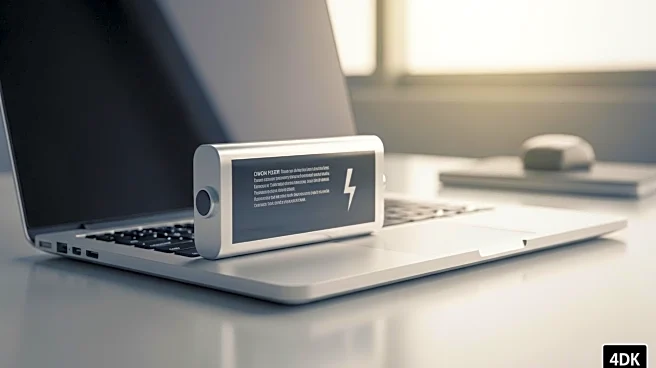What's Happening?
Avenir Telecom, a French design company, has announced a new line of Energizer EnergyBook laptops featuring exceptionally large batteries. The flagship model, the EnergyBook Pro Ultra, is equipped with a four-cell 13,000 mAh/192Wh battery, capable of providing up to seven days of standby time, 28 hours of office use, or 11 hours of gaming and graphic design. However, the battery size exceeds the Federal Aviation Administration's (FAA) standard limit of 100 watt hours for laptop batteries on flights, potentially restricting their use during air travel. The FAA allows some exceptions for batteries between 101Wh and 160Wh with airline approval, but the Pro Ultra's 192Wh battery surpasses these limits. The EnergyBook Ultra also features an AMD Ryzen 5 processor, 16GB of DDR4 RAM, a 512GB SSD, and an 18-inch 1080p screen. Other models in the series, the EnergyBook Pro 15 and Pro XL 18.5, are set for release on October 15, while the Ultra is still undergoing certification testing.
Why It's Important?
The introduction of these laptops highlights a significant advancement in battery technology, offering extended usage times that could appeal to consumers seeking long-lasting devices. However, the large battery size presents a challenge for air travelers, as current FAA regulations may limit the ability to carry these laptops on flights. This situation underscores the ongoing tension between technological innovation and regulatory frameworks, particularly in the context of safety and transportation. The laptops' potential restrictions could impact their marketability and consumer adoption, especially among frequent travelers. Additionally, the development may prompt discussions within the tech industry and regulatory bodies about updating guidelines to accommodate new technological capabilities.
What's Next?
As the EnergyBook Ultra undergoes certification testing, Avenir Telecom may need to engage with regulatory authorities to address the air travel limitations posed by the large battery size. The company might also explore alternative solutions, such as offering models with smaller batteries or seeking special approvals for air travel. The response from consumers and the broader tech industry will likely influence future product designs and regulatory considerations. Airlines and safety regulators may also need to reassess current guidelines to balance safety concerns with technological advancements.









